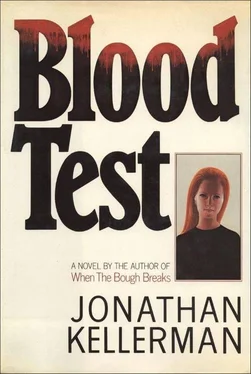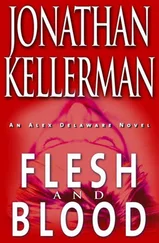Jonathan Kellerman - Blood Test
Здесь есть возможность читать онлайн «Jonathan Kellerman - Blood Test» весь текст электронной книги совершенно бесплатно (целиком полную версию без сокращений). В некоторых случаях можно слушать аудио, скачать через торрент в формате fb2 и присутствует краткое содержание. Город: New York, Год выпуска: 1986, ISBN: 1986, Издательство: Atheneum, Жанр: Триллер, на английском языке. Описание произведения, (предисловие) а так же отзывы посетителей доступны на портале библиотеки ЛибКат.
- Название:Blood Test
- Автор:
- Издательство:Atheneum
- Жанр:
- Год:1986
- Город:New York
- ISBN:978-0689116346
- Рейтинг книги:4 / 5. Голосов: 1
-
Избранное:Добавить в избранное
- Отзывы:
-
Ваша оценка:
- 80
- 1
- 2
- 3
- 4
- 5
Blood Test: краткое содержание, описание и аннотация
Предлагаем к чтению аннотацию, описание, краткое содержание или предисловие (зависит от того, что написал сам автор книги «Blood Test»). Если вы не нашли необходимую информацию о книге — напишите в комментариях, мы постараемся отыскать её.
Blood Test — читать онлайн бесплатно полную книгу (весь текст) целиком
Ниже представлен текст книги, разбитый по страницам. Система сохранения места последней прочитанной страницы, позволяет с удобством читать онлайн бесплатно книгу «Blood Test», без необходимости каждый раз заново искать на чём Вы остановились. Поставьте закладку, и сможете в любой момент перейти на страницу, на которой закончили чтение.
Интервал:
Закладка:
I called Helen again and told her I’d secured the release of the esteemed Dr. Melendez-Lynch. She thanked me effusively and was starting to lapse into tears before I cut her off. For her own good.
15
THE SEVILLE glided onto the interstate shortly past noon. The first half of the two-hour journey to La Vista was a southward slice through the industrial underbelly of California. I sped past stockyards and freight docks, mammoth auto dealerships, grimy warehouses, and factories belching effluvia into a sky obscured by billboards. I kept the windows closed, the air conditioning on, and Flora Purim on the tape deck.
At Irvine the terrain shifted suddenly to endless expanses of green — fields of rich, dark soil stitched precisely with emerald rows of tomatoes, peppers, strawberries, and corn, spasmodically bathed by whirligig sprinklers. I opened the window and let in the good stench of manure. A while later the highway edged closer to the ocean and the fields gave way to the affluent suburbs of Orange County, then thinned to miles of empty scrub enclosed by barbed chain-link fence — government land, rumored to harbor secret nuclear testing plants.
Just past Oceanside, traffic going the other way slowed to a crawl: the Border patrol had set up a spot check for illegal aliens. Gray-uniformed officers in Smoky the Bear hats peered into each vehicle, waving on the majority, pulling a few over for closer scrutiny. The process had a ceremonial look to it, which was appropriate, for stemming the tide of those yearning for the good life was as feasible as capturing the rain in a thimble.
I exited a few miles later, heading east on a state highway that slogged through blocks of fast-food joints and self-serve gas stations before turning into two-lane blacktop.
The road rose, climbing toward mountains veiled by lavender mist. Twenty minutes out of the junction and there wasn’t another vehicle in sight. I passed a granite quarry where mantislike machines dipped into the earth and brought up piles of rocks and dirt, a horse ranch, a field of grazing Holsteins, then nothing. Dusty signs heralded the construction of “luxury planned communities” and “townhomes,” but apart from one abandoned project — the roofless remains of a warren of small houses crammed into a sun-baked gully — it was empty, silent land.
As the altitude increased the scenery grew lush. Acres of eucalyptus-shaded citrus groves and a mile of avocado preceded the appearance of La Vista. The town sat in a valley at the foot of the mountains, surrounded by forest, vaguely alpine. A wayward glance and I would have missed it.
The main drag was Orange Avenue and a good part of it was given over to a sprawling gravel yard filled with somnolent threshers, tillers, bulldozers, and tractors. A long, low, glass-fronted structure occupied one end of the yard and a worn wooden sign above the entrance announced sales, rental, and repair of farm equipment and power tools.
The street was quiet and ribbed with diagonal parking lines. Few of the spaces were occupied, those that were housed half-ton pickups and old sedans. The posted speed limit was 15 m.p.h. I decelerated and coasted past a dry-goods store, a market, an eight-dollar-a-visit chiropractor (“no appointment necessary”), a barbershop complete with spinning pole, and a windowless tavern named Erna’s.
City Hall was a two-story square of pink cinder block midway through the town. A concrete walkway ran down the center of a well-tended lawn, flanked by towering date palms, and leading to brass double doors, propped open. Weathered brass rods bearing Old Glory and the flag of California jutted out above the entrance.
I parked in front of the building, stepped out into the dry heat, and walked to the door. A plaque commemorating La Vista’s World War II dead and dated 1947 was inlaid in the block at eye level, just left of the doorpost. I stepped into an entry hall containing a pair of slat-backed oak benches and nothing else. I looked for a directory, saw none, heard the sound of typing and walked toward it, footsteps echoing in the empty corridor.
There was a woman pecking at a Royal manual in a stuffy room full of oak file cabinets. Both she and her machine were of antique vintage. An electric fan perched atop one of the files spun and blew, causing the ends of the woman’s hair to dance.
I cleared my throat. She looked up with alarm, then smiled, and I asked her where the sheriff’s office could be found. She directed me to a rear stairwell leading to the second floor.
At the top of the stairs was a tiny courtroom that looked as if it hadn’t been used in a long time. The word SHERIFF had been painted in glossy black on lime green plaster. Underneath it, was an arrow pointing to the right.
La Vista law enforcement was headquartered in a small dark room containing two wooden desks, an unmanned switchboard, and a silent teletype machine. A map of the county covered one wall. Wanted posters and a well-stocked gun rack rounded out the decor. At the center of the rear wall was a metal door with a four inch wire-glass window.
The beige-uniformed man at one of the desks looked too young to be a peace officer — pink chipmunk cheeks and guileless hazel eyes under brown bangs. But he was the only one there and the nametag over his breast pocket said Deputy W. Bragdon. He was reading a farm journal and when I entered, looked up and gave me a cop’s stare: wary, analytic, and inherently distrustful.
“I’m Dr. Delaware, come to pick up Dr. Melendez-Lynch.”
W. Bragdon stood, hitched up his holster, and disappeared through the metal door. He returned with a man in his fifties who could have stepped off a Remington canvas.
He was short and bow-legged, but broad shouldered and rock-solid, and he walked with a hint of a bantam swagger. His razor-creased trousers were of the same tan material as the deputy’s uniform, his shirt green plaid and pearl buttoned. A crisp, wide-brimmed Stetson rested squarely atop his long head. The suggestion of vanity was confirmed by his tailoring: the shirt and slacks had been tapered to hug a trim physique.
The hair under the hat was dun and cropped close to narrow temples. His facial features were prominent and somewhat avian. A thick gray handlebar mustache flared under a strong beakish nose.
I was drawn to his hands, which were unusually thick and large. One rested on the butt of a long-barreled Colt.45 nestling in a hand-tooled holster, the other extended in a handshake.
“Doctor,” said a deep mellow voice, “Sheriff Raymond Houten.” His grip was solid but he didn’t exert pressure — a man well aware of his own strength.
He turned to Bragdon. “Walt.” The baby-faced deputy looked me over once more and returned to his desk.
“Come on in, Doctor.”
On the other side of the tiny mesh window were ten feet of corridor. To the left was a bolted metal door, to the right his office, high-ceilinged, sunlit, and redolent of tobacco.
He sat behind an old desk and motioned me to a scarred leather armchair. Removing his hat, he tossed it on a rack fashioned from elk antlers.
Pulling out a pack of Chesterfields, he offered me one and when I declined, lit up, leaned back, and looked out the window. A large bay window afforded a view of Orange Avenue and his eyes followed the path of a semi hauling a load of produce. He waited until the big truck had rumbled out of sight before speaking.
“You’re a psychiatrist?”
“Psychologist.”
He held the cigarette between thumb and forefinger and inhaled.
“And you’re here as Dr. Lynch’s friend, not in a professional capacity.”
His tone implied the latter would have been more than appropriate.
“That’s correct.”
“I’ll take you to see him in just a minute. But I want to prepare you. He looks like he fell into a combine. We didn’t do it.”
Читать дальшеИнтервал:
Закладка:
Похожие книги на «Blood Test»
Представляем Вашему вниманию похожие книги на «Blood Test» списком для выбора. Мы отобрали схожую по названию и смыслу литературу в надежде предоставить читателям больше вариантов отыскать новые, интересные, ещё непрочитанные произведения.
Обсуждение, отзывы о книге «Blood Test» и просто собственные мнения читателей. Оставьте ваши комментарии, напишите, что Вы думаете о произведении, его смысле или главных героях. Укажите что конкретно понравилось, а что нет, и почему Вы так считаете.












